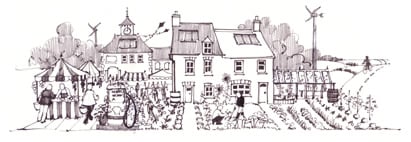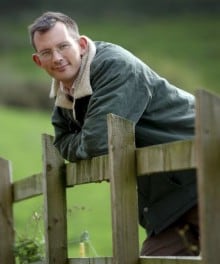Many readers on our site lament the inertia or hostility we all frequently encounter when trying to ‘wake up’ family, friends, and neighbors to the warning bells we see on the economic, energy, and environmental fronts. Chris and I often get asked for advice on how to make the red pill ‘tasty’ for the uninitiated. So we look at the success Rob’s model is having at spurring individuals and communities to action, and ask him: What’s your secret?
In short, it’s about making Transition feel “more like a party than a protest march.” Make it personal to the participants. Focus on celebrating the local benefits and empowerment it produces. As Rob says, the core Transition principles are “not about taking people back to something worse than today; they are a step forward. They are about building resilience, bringing people together, giving them the sense that anything is possible in such a way that everybody benefits.”
The stories that we tell ourselves determine the decisions we make. Transition is all about providing new stories that help people come to terms with pressing issues from a positive angle. “When we started Transition,” Rob reflects, “I imagined it was an environmental process. But increasingly I think of it as a cultural process. It starts to become this story that the town tells about itself.”
Participating in Transition does not mean that you have to already ascribe to Peak Oil or climate change or the end of growth. It can simply be a source of projects that yield positive ROI on the resources you have to invest. Rob mentions an example in his hometown of Totnes, UK where the community is funding on-site wind turbines: “You would rather have your money in a local energy company where you know the people who run it. You’re excited about its progress. You know other people that are a part of it, rather than just having your money off in distant shares of something that you have no control over.” Localized economic development is an extremely powerful new trend Rob sees society just beginning to scratch the surface of.“We very much took [building local resilience] as our focus because it felt like it was the part that was being neglected. It is the part that people are passionate about, that they care about. My sense is that people will get this at different points. And if we imagine that everybody needs to get this before we can actually do anything meaningful, we are not going to do anything meaningful in time. So the idea with Transition is that if we can get things in place which just make sense, which don’t ram Peak Oil and climate change and economic models down people’s throats, but which become the things that are creating work for people, they become the things that people are proudest of because they are celebratory of the place and of the culture.”
And having this growing set of Transition Town ‘success story’ templates in place is yielding value as more and more communities increasingly find themselves looking for solutions the harsh economic and resource realities of today. In times of crisis, the solutions that get adopted are the ones that are already on the table. The more tested, operational and sustainable models we have ready and available for local resiliency, the better prepared we’ll be to meet the future.
In this interview, Chris and Rob discuss what we can learn from the growing number of Transition Town case studies and where the movement is headed next.
Click the play button below to listen to Chris’ interview with Rob Hopkins (runtime 47m:17s):
Or click here to read the full transcript.
Rob Hopkins is the co-founder of Transition Town Totnes and of the Transition Network. This grew out of many years experience in education, teaching permaculture and natural building, and setting up the first 2 year full-time permaculture course in the world at Kinsale Further Education College in Ireland, as well as coordinating the first eco-village development in Ireland to be granted planning permission.
He is author of The Transition Handbook: from oil dependence to local resilience, which has been published in a number of other languages and was voted the 5th most popular book taken on holiday by MPs during the summer of 2008, and of The Transition Companion: Making Your Community More Resilient in Uncertain Times, published in October 2011. He publishes the blog www.transitionculture.org.
This is a companion discussion topic for the original entry at https://peakprosperity.com/rob-hopkins-making-the-red-pill-taste-good-2/


